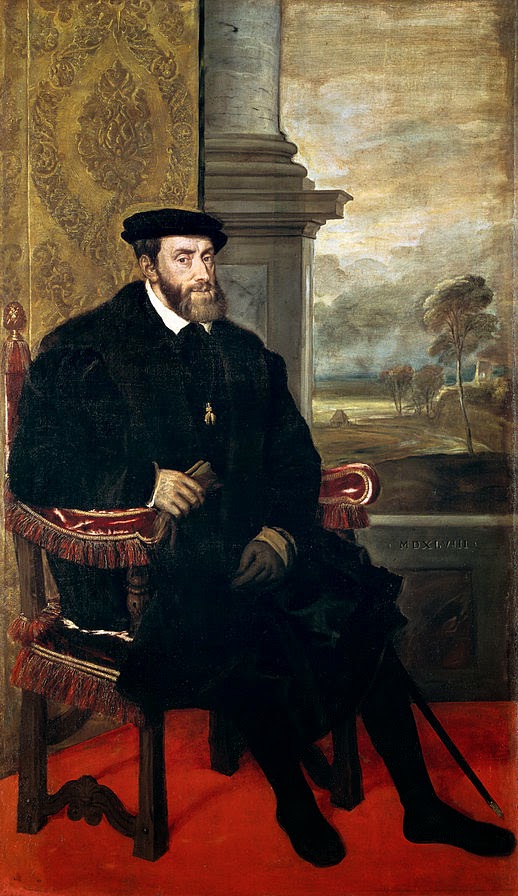Previously on The Peace of Augsburg and the Abdication of Charles V. And now William Robertson.
Time: 1555
Place: Augsburg, Germany
 |
| Charles V by Titian and his colleague Lambert Sustris. cc Wikipedia |
As this, then, appeared to be the proper juncture for executing the scheme which he had long meditated, Charles resolved to resign his kingdoms to his son with a solemnity suitable to the importance of the transaction, and to perform this last act of sovereignty with such formal pomp as might leave a lasting impression on the minds not only of his subjects, but of his successor. With this view he called Philip out of England, where the peevish temper of his queen, which increased with her despair of having issue, rendered him extremely unhappy; and the jealousy of the English left him no hopes of obtaining the direction of their affairs. Having assembled the states of the Low Countries at Brussels, on October 25th, Charles seated himself for the last time in the chair of state, on one side of which was placed his son, and on the other his sister the Queen of Hungary, regent of the Netherlands, with a splendid retinue of the princes of the empire and grandees of Spain standing behind him. The president of the council of Flanders, by his command, explained in a few words his intention in calling this extraordinary meeting of the states. He then read the instrument of resignation, by which Charles surrendered to his son Philip all his territories, jurisdiction, and authority in the Low Countries, absolving his subjects there from their oath of allegiance to him, which he required them to transfer to Philip, his lawful heir, and to serve him with the same loyalty and zeal which they had manifested, during so long a course of years, in support of his government.
Charles then rose from his seat, and leaning on the shoulder of the Prince of Orange, because he was unable to stand without support, he addressed himself to the audience, and from a paper which he held in his hand, in order to assist his memory, he recounted with dignity, but without ostentation, all the great things which he had undertaken and performed since the commencement of his administration. He observed that, from the seventeenth year of his age, he had dedicated all his thoughts and attention to public objects, reserving no portion of his time for the indulgence of his ease, and very little for the enjoyment of private pleasure; that, either in a pacific or hostile manner, he had visited Germany nine times, Spain six times, France four times, Italy seven times, the Low Countries ten times, England twice, Africa as often, and had made eleven voyages by sea; that while his health permitted him to discharge his duty, and the vigor of his constitution was equal, in any degree, to the arduous office of governing such extensive dominions, he had never shunned labor, nor repined under fatigue; that now, when his health was broken, and his vigor exhausted by the rage of an incurable distemper, his growing infirmities admonished him to retire; nor was he so fond of reigning as to retain the scepter in an impotent hand, which was no longer able to protect his subjects, or to secure to them the happiness which he wished they should enjoy; that instead of a sovereign worn out with diseases, and scarcely half alive, he gave them one in the prime of life, accustomed already to govern, and who added to the vigor of youth all the attention and sagacity of maturer years; and if, during the course of a long administration, he had committed any material error of government, or if, under the pressure of so many and great affairs, and amid the attention which he had been obliged to give to them, he had either neglected or injured any of his subjects, he now implored their forgiveness; that, for his part, he should ever retain a grateful sense of their fidelity and attachment, and would carry the remembrance of it along with him to the place of his retreat, as his sweetest consolation, as well as the best reward for all his services, and in his last prayers to Almighty God would pour forth his most earnest petitions for their welfare.
Continued on Monday, November 3rd.
More information here.
No comments:
Post a Comment